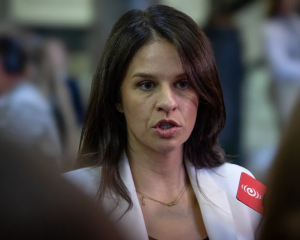Opposition parties warned power prices would rise uncontrollably under the National Government's partial privatisation of power companies as the law approached its final stages in Parliament last night.
The Mixed Ownership Model Bill, which allows for the sale of 49 per cent of Mighty River Power, Genesis Energy, Meridian Energy and coal company Solid Energy, was debated at the committee stage yesterday.
Once the committee stage is completed, the law will receive its third and final reading before passing, possibly by the end of the week.
That would allow the Government to proceed with the sale of Mighty River shares within three months.
"We're getting to the end of what is to most New Zealanders an obnoxious piece of legislation that overwhelmingly in this country people oppose," Labour leader David Shearer said as the debate began.
The legislation would result in "a wholesale shift of property and assets in the New Zealand public's ownership ... into the hands of a small eliteof people who can afford to buy shares".
Before yesterday's debate, Labour, the Greens and New Zealand First lodged a flurry of proposed amendments which will inevitably be voted down but are intended to slow the bill's progress.
"Every hour and every day we can prevent it being passed is an hour and a day that the Kiwi taxpayer keeps their assets which this Government is determined to sell," said Labour's SOE spokesman, Clayton Cosgrove.
Prime Minister John Key said that the public, who polls have shown largely oppose the plan, would come around.
"Over time, as they get to see the merits of the overall programme and recognise what the Government's trying to do, which is basically to build more assets for New Zealanders but not put more debt on the balance sheet, and as they have an opportunity to invest, I think they will warm to that. I think it will take some time but I think they will get there."
But Mr Shearer said New Zealanders he had spoken to in recent months said their biggest concern was that the price of electricity would rise.
"We know that the three major power companies are actually well and efficiently run. So the only way you can get an efficient company to generate more profit is by putting up the price."
Greens co-leader Russel Norman said the electricity market remained "deeply uncompetitive".
"So by the Government transferring these assets away from being state-owned enterprises and the ability of the Government to put some pressure on them, what we are guaranteeing is that these companies can freely pursue their right to charge monopoly rates and monopoly prices."
The Opposition has cited figures prepared by independent energy analyst Molly Melhuish suggesting private companies charged 13 per cent more for electricity than their SOE counterparts as evidence prices will rise under partial private ownership.
Energy and Resources Minister Phil Heatley challenged Mrs Melhuish's figures, saying she had not included all underlying factors such as the geographical distribution of power companies' customers, differing line charges and seasonal variations.
Mrs Melhuish last night stood by her figures, which were compiled from official data, and she offered to take Mr Heatley through them.
Finance Minister Bill English, however, dismissed concerns about prices as "nonsense". More New Zealanders than ever were switching suppliers to find the lowest price, he said.
"Does [Mr Shearer] seriously believe that hundreds of thousands of New Zealanders are systematically paying more for electricity than they could?" Mr English said.
Mr Shearer's theory about prices "relies on Labour's belief that most New Zealanders are stupidly paying 13 per cent more for their power than they could if they just chose to pay less".
- Adam Bennett, NZ Herald












